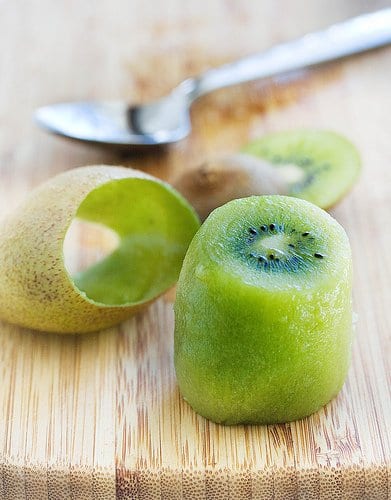The kiwifruit, often shortened to kiwi in many parts of the world, is the edible berry of a cultivar group of the woody vine Actinidia deliciosa and hybrids between this and other species in the genus Actinidia.
The most common cultivars of kiwifruit are oval, about the size of a large hen's egg (5–8 cm / 2–3 in long and 4.5–5.5 cm / 1¾–2 in diameter). It has a fibrous, dull brown-green skin and bright green or golden flesh with rows of tiny, black, edible seeds. The fruit has a soft texture and a unique flavour, and today is a commercial crop in several countries, mainly in Italy, New Zealand, Brazil and Chile.
Also known as the Chinese gooseberry,[1] the fruit was renamed for export marketing reasons in the 1950s; briefly to melonette, and then later by New Zealand exporters to kiwifruit. The name "kiwifruit" comes from the kiwi — a brown flightless bird and New Zealand's national symbol. Kiwi is also a colloquial name for the New Zealand people.
The importer in the US, Ziel & Co in San Francisco suggested the old name of Chinese gooseberry was unsuitable, recommending instead a short, Maori name. Jack Turner initiated the name "kiwifruit" around 1962[2] as part of Turners & Growers marketing response to this feedback, and the name became a global brand. The trademark was not registered internationally, however. To distinguish 'Kiwi kiwifruit', the trademark Zespri was registered in 1997.
Kiwifruit also contains many vitamins and mineral. It is a big source of various vitamins and minerals.
 |
| Kiwifruit |
 |
| Peeled Kiwifruit |
It’s a great fruit to add to your detox diet juicing recipes because its a good source of vitamin C.
Kiwi fruit is said to promote respiratory health and ease wheezing and night coughing. A fruit salad of sliced kiwi fruit with a little cinnamon powder sprinkled over and a dribble of honey before bedtime is comforting and helpful. An ancient Chinese cure for shortness of breath and coughing spasms is syrup made of fresh kiwi fruit with honey and finely crushed aniseed.